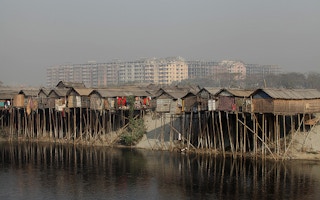Improving urban finance for the least-developed countries is a “global development imperative”.
That’s a key message of a recent United Nations report, which argues that cities need more funding options as they grapple with challenges such as rapid growth, climate change and improving public health.
The report, “Financing Sustainable Urban Development in the Least Developed Countries”, concludes that new borrowing mechanisms, local financial support and more revenue generation by cities are critical to keep municipalities solvent.
The report aims to introduce city leaders to the range of financial and investment mechanisms available to them.
Bank loans, public-private partnerships and support from local, regional and national development banks are among the options. Another approach is for cities to sell equity stakes in projects in exchange for upfront funds.
[See: Breaking municipal finance down to its basics]
Municipalities also can sell bonds to raise revenue for projects. The nascent municipal bond market in China is poised for swift expansion after Beijing and other cities issued debt securities in 2015 totaling USD 91 billion, the authors note.
By comparison, India has been a laggard in this area. In 1998, Ahmedabad became the first Indian city to issue a municipal bond, but few cities followed its lead. Over the next 15 years, only 25 more municipal bonds were unveiled across India.
The report was published in late May by the Financing for Development Office of the UNDepartment of Economic and Social Affairs, and the UNCDF, the UN’s capital investment agency for the 48 least-developed nations.
Cities must lead
While the Sustainable Development Goals and other multi-stakeholder frameworks, such as the Addis Ababa Action Agenda, aim to improve urban financing opportunities, local officials are best positioned to take the lead, the authors contend.
That is because city governments will play a “critical” role in ensuring that development efforts reach the poorest and most vulnerable residents.
[See: Three ways to ‘localize’ financing for sustainable urban development’]
Responsible public financial management is described in the report as a “prerequisite” for effective allocation of municipal resources. Improvements can help cities boost their creditworthiness, paving the way toward greater financing opportunities.
A key component is participatory budgeting, which gives everyday citizens a voice in deciding how public assets are allocated. Another priority is capacity building within local authorities — attracting highly skilled urban planners and fiscal experts who can manage the complexities of rapid growth and how to pay for it.
But implementing sound and transparent financial systems can take years — even decades, the report cautions. Strong political support, tailoring policies to fit a city’s unique needs and coordination with stakeholders are essential ingredients.
Urban case studies
The research features several case studies that demonstrate how emerging cities are tapping financial markets via partnerships and innovative funding mechanisms. Among the highlights:
- “Can do” in Ouagadougou: In 2006, Burkina Faso’s capital took advantage of an innovative “hybrid financing solution” offered by the French Development Agency (AFD) to rebuild a central market destroyed by fire. AFD handled the technical and financial elements of the project. Loan simulations enabled authorities to gauge how much they could borrow. The “hybrid” came in the form of a grant and loan from the AFD.
- Dakar’s muni bond lessons: When Senegal’s finance minister disrupted a years-long effort by Dakar to sell the city’s first municipal bond, the setback reverberated across the Global South. The drama underscored the importance of strong national support for local funding efforts.
[See: How Dakar (almost) got its first municipal bond to market]
- Financial support for Dhaka: The Bangladesh Municipal Development Fund plays a critical role in filling an infrastructure funding gap. Many of the 313 governing districts that comprise this megacity lack the ability to plan and finance infrastructure projects. The fund, backed by the government and multilateral institutions, offers short-term loans and grants while guiding localities on long-term, self-sufficient funding.
A pervasive theme connects the policy recommendations and case studies featured in the report: the benefits of greater cooperation. Interaction among urban financial stakeholders is key to building support for funding efforts and ensuring that city leaders are informed about potential revenue choices.
Cooperation can range from knowledge sharing and technical expertise to capacity building and financial assistance.
The authors also underscore the need for so-called “South-South” cooperation in which Global South cities partner together — and learn from each other.
“South-South cooperation builds on the solidarity among developing countries,” the report says. It can “promote the exchange between partners at similar stages of development or that have recent experience with the developmental process.”
This story was published with permission from Citiscope, a non-profit news outlet that covers innovations in cities. More at Citiscope.org.

















